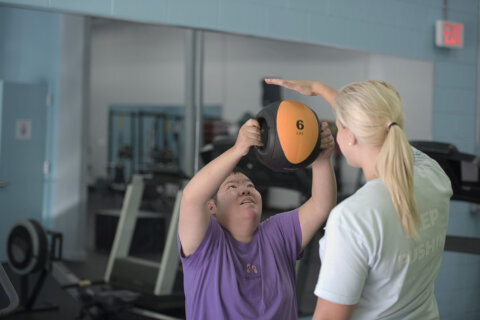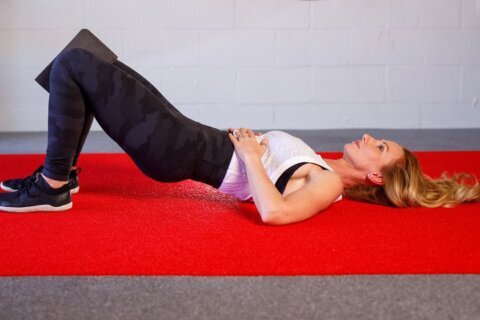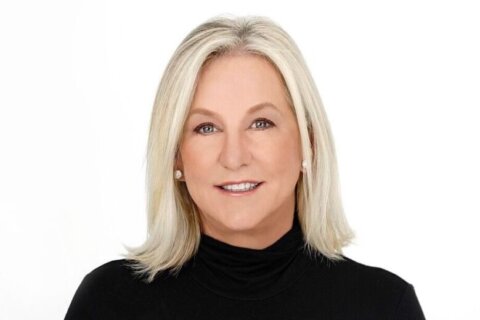As we struggle through month after month of the pandemic, it can be difficult to keep a positive attitude about the present and the future.
Even in a pandemic, positive psychiatrist Dr. Samantha Boardman suggests the best approach might be to build strength and positivity from within. In her new book, “Everyday Vitality: Turning Stress into Strength,” Boardman offers step-by-step instructions for getting the most out of each day.
CNN recently caught up with Boardman to discuss strategies for incorporating more mindfulness into our everyday lives.
This conversation has been edited and condensed for clarity.
CNN: The pandemic has forced us to take a closer look at mental health. Why is this such an important part of who we are and how we live every day?
Dr. Samantha Boardman: Amid all the chaos and negativity, the emphasis on mental health certainly is a positive turn we’ve taken. Celebrities are opening up about their struggles. People are more well versed and more fluent in the language of mental health. I think people still are more understanding about the mental health of others than they are about their own. This is called Solomon’s Paradox. Apparently, King Solomon was a wise ruler, but his own life was a total mess.
People aspire to perfection in their social lives and their achievements. They are unwilling to forgive themselves and or see anything less than those ultimate goals. Anything short of that is failure. That’s not conducive to positive mental health. We have some room to grow in hopefully developing more understanding about our own mental health and being more understanding about our own challenges.
CNN: How do we start focusing more on our own mental health?
Boardman: We can stop ruminating. Rumination is when you’re stewing in something, and you can’t let go. It’s not helpful. I think of it like chewing your cud or as a ticker tape on the bottom of your screen. It is pure self-immersion, going over the same thing again and again. When you focus too much on the little things, you don’t have perspective. With perspective, at 30,000 feet, you can reconstrue a situation, and you see it with clarity.
Maybe you need to make an appointment for a therapist. Maybe you would feel better if you went for a walk. It’s important to interrupt those cycles of rumination since they can be an on-ramp to depression and anxiety. One cognitive strategy to do this is to ask yourself, “If a friend was ruminating like this, what would I say to that person at this moment?” You’d be amazed at where the process of asking that takes you.
CNN: How and where does mindfulness fit into mental health?
Boardman: It’s important to understand that how we perceive stress is more important than the stress itself. Our perception of stress is often dictated by the resources we feel you have available. Do you feel supported by others? Do you feel like people have your back? One of the most important contributors to well-being is other people and feeling connected and loved and feeling part of a social network. Even if we can’t see people in real life, what are we doing to cultivate our relationships?
Another great antidote for stress is helping people, doing something that makes you feel like you’re adding value. Here it could be something simple, maybe helping your neighbor pick up something at the grocery store. You can get these little uplifts in everyday ways. The truth is that we often miss out on the social side of well-being. Other people matter in our lives.
CNN: What makes some people more resilient than others in the face of stress and collective trauma?
Boardman: Some people are more Teflon — stressors don’t stick to them — while others are more Velcro — stressors stay stuck to them. Stressful moments have an immediate impact on us. They annoy us. Our blood pressure goes up. Micro-stressors — these everyday things —these irritations and annoyances add up over time.
We often react to micro-stressors in ways that are counterproductive. I call them uplift imposters. I’m stressed so I tell myself I need to order a fried egg and cheese sandwich, or that I need to cancel plans with friends. These decisions masquerade as stress buffers but they amplify how drained we feel.
CNN: So how should people think differently about dealing with micro-stressors?
Boardman: What are some of the things we can do? I refer to them as the three C’s: Connecting with others, contributing to something beyond yourself, and feeling challenged in some way. On the first point, how are you connecting with others in some way? if you are having some positive interactions with other human beings in a day, it will uplift you. On the second point, what are you doing beyond your own self? How are you a part of something bigger? On the last point, what are you doing to make yourself feel challenged in a positive way?
These activities create a sense of uplift. They help build an armor around you so when these little stressors happen, they’re much less likely to get under your skin. Muhammad Ali said, “It isn’t the mountains ahead to climb that wear you out, it’s the pebble in your shoe.” There is truth to that. You are less likely to feel pummeled by the little things when you’re deliberate about adding the three C’s into your life.
CNN: What does “vitality” mean to you?
Boardman: To me, vitality is that positive feeling of aliveness and energy. It’s the very heart of well-being. The opposite of depression isn’t happiness; it’s vitality. And vitality comes through our actions. It’s about what we’re doing in our lives; it’s both physical and psychological. And it’s different for every person at every stage of their lives. It’s dynamic. What worked for you in your 20s may not work for you in your 30s or 40s, and you need to be clued into that and adapt. A key with vitality is being flexible, allowing yourself to change, allowing others to change.
CNN: Why is it so important to be deliberate in the way you approach mindfulness and resiliency?
Boardman: One of the strategies in behavioral psychology is to make the behaviors you want to accomplish easier. If you want to work out, for example, it might be putting your sneakers by the door. I have a patient who only wears a jogging bra, because, if she doesn’t, she won’t get to the gym.
One of the most devitalizing experiences is when we feel like we’re a tumbleweed, we are blown around by everyone else’s wants and needs, we’re not being deliberate about what we care about. For that reason, being deliberate is critical.
I ask patients to write down the things they care about most. Then I ask them to think about how they spend their free time. I challenge them to find the overlap — that’s the sweet spot. When you can have more overlap between what your values are and what your actions are, you’ll be far more resilient, and you’ll approach everything with a greater sense of vitality.
The-CNN-Wire
™ & © 2021 Cable News Network, Inc., a WarnerMedia Company. All rights reserved.







